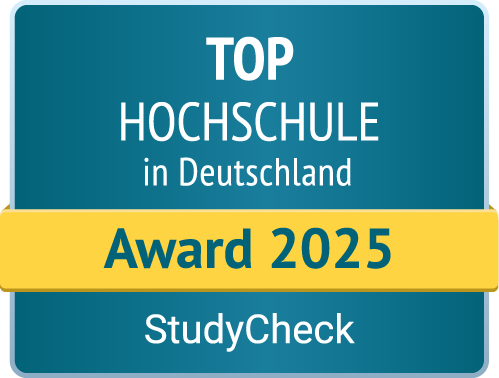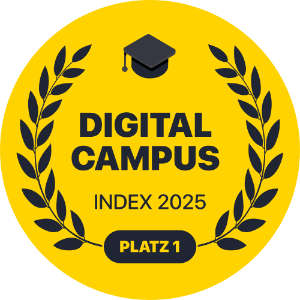Faculty of Media
Departmental Journalism (RJO)


Study overview
Independent journalism fulfils a central task in our democratic society. The Ansbach departmental journalism programme trains future journalists with relevant specialist expertise in a Bachelor's degree course that is unique in Germany. In seven semesters, students learn all the relevant basics of communication science and are also prepared for professional practice in all media genres. Renowned professionals train them in the journalistic work phases from research to the production of texts, podcasts and videos to radio programmes, cross-media projects and social media formats. They use state-of-the-art equipment with professional radio and television studios, cameras and editing suites. Special attention is paid to the digital dynamics in the editorial offices and the responsible use of the new AI programmes.
A special feature of the Ansbach departmental journalism programme is the specialist training in the main course of study. Similar to the editorial departments, students concentrate on a subject of their choice before completing an internship semester in an editorial office or media company. Thanks to their high level of practical and specialist expertise, graduates of the Departmental Journalism degree programme can be deployed flexibly, particularly with regard to cross-media work.
| Short form | RJO |
| Type of study | Full time |
| Standard period of study | 7 semesters |
| Award | Bachelor of Arts (B.A.) |
| Start of studies | Winter semester |
| Admission Restrictions | none |
| Lecture location | Ansbach |
| Language of instruction | German |
| Course management | Prof. Sabine Böhne-Di Leo |
| Student advisory service | Prof. Dr. Thomas Liesen |
| Internship Officer RJO | Prof. Dr. Jana Wiske |
| Student Services | studierendenservice.rjo(at)hs-ansbach.de |
Ressorts
A special feature of Ansbach's Departmental Journalism are the focus modules in the main study period. In line with editorial departments and new innovative subject areas, the students concentrate on a subject of their choice before they complete a practical semester in an editorial office or a media company. Due to their high level of practical and technical competence, graduates of the journalism degree programme can be deployed flexibly – especially, within the interface area of media convergence.

Environment
Cyclones, earthquakes or heat waves make the previously rather abstract references to climate change or the hole in the ozone layer central themes.

Sports
The study focus on sport offers more than just the game on the pitch: How does a live ticker work? Where does bodily injury begin?

Culture and lifestyle
In the focus on culture and lifestyle, students acquire a broad basic knowledge for working in the arts pages.

Medicine
In the focus on medicine and biosciences, students acquire the technical basics for their work in medicine and biology.

Politics and economics
In the focus on politics and economics, the students acquire the technical basics for working in political and business editorial offices.
Study structure
In the first four semesters, students acquire the basic knowledge for qualified journalistic work in all types of media in intensive training units. They are sensitised to the high degree of care and responsibility that the profession requires in times of fake news and digital mass communication. Subjects such as media ethics and media law are therefore just as much a part of the curriculum as research strategies and analysing sources. The accompanying practical study programmes include photojournalism, social media journalism and AI in the media. Modules such as media impact and reception research as well as academic work also teach communication science and theoretical skills.
In order to qualify for a journalistic department, students choose a specialisation from the third semester onwards. This is made up of seven modules in the selected subject area. This includes two practical modules in which students apply their specialist knowledge in journalistic productions such as podcasts or videos.
In the fifth semester, students complete a long-term journalistic internship in a print, digital, social media, TV or radio editorial office. In the sixth semester, they return to the university from their internships and acquire further department-specific knowledge in one of the chosen specialisations and in the respective project modules. The Bachelor's module concludes the degree programme with the written Bachelor's thesis and oral defence before students are awarded the title ‘Bachelor of Arts’.
Additional competences are taught in compulsory elective modules, which students can choose freely. They give them the opportunity to acquire important key qualifications depending on their career goal, aptitude and inclination. Examples of compulsory elective modules are
- Radio production - Rabbit Radio
- Further editorial training
- Interview training
- Multimedia local journalism
- YouTube & Instagram: Video production for journalists
- Consolidation of language skills (e.g. English, Spanish, Italian)
Further information
The head of Campusradio is Prof. Dr. Thomas Liesen.
Like its predecessor, ANgedacht, Rabbit radio is transmitted every second Thursday of the month at 20.00 hrs via its partner Afkmax. It offers a mixture of non-mainstream music, interviews, interesting studio guests and journalistic contributions to current topics.
Please click here to go to the Rabbit Radio website (German)!

The Bachelor's thesis - with Bachelor's thesis and Bachelor's seminar - concludes the course before students are awarded the title "Bachelor of Arts".
© 2025 Hochschule Ansbach




